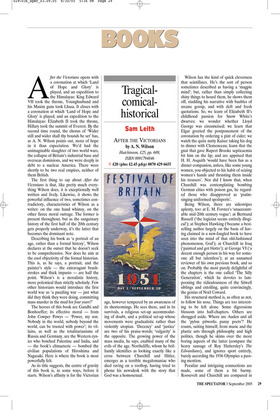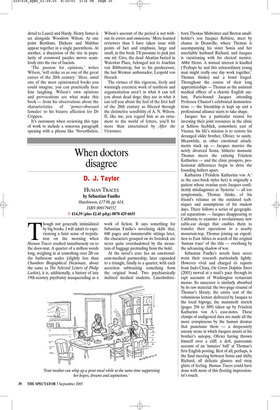Tragical comical
historical
Sam Leith
AFTER THE VICTORIANS by A. N. Wilson Hutchinson, £25, pp. 609, ISBN 0091794846 ✆ £20 (plus £2.45 p&p) 0870 429 6655 After the Victorians opens with a coronation at which ‘Land of Hope and Glory’ is played, and an expedition to the Himalayas: King Edward VII took the throne, Younghusband and his Maxim guns took Lhasa. It closes with a coronation at which ‘Land of Hope and Glory’ is played, and an expedition to the Himalayas: Elizabeth II took the throne, Hillary took the summit of Everest. By the second time round, the chorus of ‘Wider still and wider shall thy bounds be set’ has, as A. N. Wilson points out, more of hope in it than expectation. We’d had the unimaginable slaughter of two world wars, the collapse of Britain’s industrial base and overseas dominions, and we were deeply in debt to a nuclear America. There were shortly to be two real empires, neither of them British.
The first thing to say about After the Victorians is that, like pretty much everything Wilson does, it is exceptionally well written and lively. Likewise, it shows the powerful influence of two, sometimes contradictory, characteristics of Wilson as a writer: on the one hand whimsy, on the other fierce moral outrage. The former is present throughout, but as the sanguinary history of the first half of the 20th century gets properly underway, it’s the latter that becomes the dominant note.
Describing his book as ‘a portrait of an age, rather than a formal history’, Wilson declares at the outset that he doesn’t seek to be comprehensive. Nor does he aim at the cool objectivity of the formal historian. This is, as he says, a portrait; and the painter’s style — the extravagant brushstrokes and thick impasto — are half the point. Wilson’s is a moralistic history, more polemical than strictly scholarly. Few other historians would introduce the first world war as ‘a puzzling war — just what did they think they were doing, committing mass murder in the mud for four years?’ The heroes of this book are Gandhi and Bonhoeffer; its effective moral — from John Cowper Powys — ‘Power, my son. Nobody in the world, nobody beyond the world, can be trusted with power’; its villains, as well as the totalitarianisms of Russia and Germany, are the Western cynics who botched Palestine and India, and — the book’s climacteric — bombed the civilian populations of Hiroshima and Nagasaki. Here is where the book is most powerfully felt.
As its title suggests, the centre of gravity of this book is, in some ways, before it starts. Wilson’s affinity is for the Victorian age, however tempered by an awareness of its shortcomings. He sees there, and in its survivals, a religious set-up accommodating of doubt, and a political set-up whose movements were gradualistic rather than violently utopian. ‘Decency’ and ‘justice’ are two of his praise-words; ‘vulgarity’ is the opposite. The growing power of the mass media, he says, enabled many of the evils of the age. Northcliffe, whom he brilliantly identifies as looking exactly like a cross between Churchill and Hitler, emerges as a terrible megalomaniac who died raving on a rooftop, having tried to phone his newsdesk with the story that God was a homosexual. Wilson has the kind of quick cleverness that scintillates. He’s the sort of person sometimes described as having a ‘magpie mind’; but, rather than simply collecting shiny things to hoard them, he shows them off, studding his narrative with baubles of arcane gossip, and with deft and fresh quotations. So, we learn of Elizabeth II’s childhood passion for Snow White’s dwarves; we wonder whether Lloyd George was circumcised; we learn that Elgar greeted the postponement of the coronation by ordering a pint of cider; we watch the quite nutty Kaiser taking his dog to dinner with Clemenceau; learn that the gnat that gave Rupert Brooke septicaemia bit him on the lip; and are apprised that H. H. Asquith ‘would have been fun as a dinner companion, unless, like some young women, you objected to his habit of seizing women’s hands and thrusting them inside his trousers’. Nor did I know that, when Churchill was contemplating bombing German cities with poison gas, he regarded those who disapproved as ‘psalmsinging uniformed spoilsports’.
Being Wilson, there are sideswipes aplenty, too: at E. M. Forster’s ‘unaccountable mid-20th century vogue’; at Bertrand Russell (‘the logician seems entirely illogical’); at Stephen Hawking (‘became a bestselling author largely on the basis of having claimed in a new-fangled book to have seen into the mind of that old-fashioned phenomenon, God’); at Churchill in Iraq (‘painted and got blotto’); at George VI (‘a decent enough person in his way for someone all but talentless’); at an unnamed reviewer of his own previous book, and so on. Probably the most purely delightful of the chapters is the one called ‘The Silly Generation’, which he devotes to lampooning the ridiculousness of the Sitwell siblings and extolling, quite convincingly, the genius of Noël Coward.
His structural method is, as often as not, to follow his nose. Things are too interesting to be left alone. Some digressions blossom into half-chapters. Others are shrugged aside. Where are Auden and all the ‘pylon pitworks pansy poets’? He roams, suiting himself, from music and the plastic arts through philosophy and high politics, though he skims over the more boring aspects of the latter (compare the heavy sausage of Roy Hattersley’s The Edwardians), and ignores sport entirely, barely according the 1936 Olympics a passing mention.
Peculiar and intriguing connections are made, some of them a bit barmy. Roosevelt and Churchill are compared in detail to Laurel and Hardy. Henry James is set alongside Woodrow Wilson. At one point Bentham, Dickens and Malthus appear together in a single parenthesis. At another, a discussion of the rise in popularity of crossword puzzles moves seamlessly into the rise of fascism.
‘The passion for opinions,’ writes Wilson, ‘will strike us as one of the great curses of the 20th century.’ Here, amid one of the most opinionated books you could imagine, you can practically hear him laughing. Wilson’s own opinions and provocations are what make this book — from his observations about the characteristics of ‘power-obsessed females’ to his bizarre affection for Dr Crippen.
It’s customary when reviewing this type of work to include a sonorous paragraph opening with a phrase like ‘Nevertheless, Wilson’s account of the period is not without its errors and omissions.’ More learned reviewers than I have taken issue with points of fact and emphasis, large and small, in this book. I’ll presume to pick just one nit: Giro, the dead Alsatian buried in Waterloo Place, belonged not to Joachim von Ribbentrop, but to his predecessor, the last Weimar ambassador, Leopold von Hoesch.
The virtues of this vigorous, lively and winningly eccentric work of synthesis and argumentation aren’t in what it can tell you about dead dogs; they are in what it can tell you about the feel of the first half of the 20th century as filtered through the distinctive sensibility of A. N. Wilson. If, like me, you regard him as an ornament to the world of letters, you’ll be more than entertained by After the Victorians.










































 Previous page
Previous page